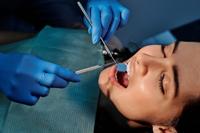
Photo by Daniela Elena Tentis via Pexels
By Stephen Beech
Adopting a Mediterranean-style diet may help reduce the risk of gum disease, according to new research.
People living in the UK and following a diet close to the Mediterranean diet are more likely to have better gum health, dentists say.
The findings of the King’s College London study indicate that people not following a Med-style diet tended to have more severe gum disease, especially if they ate red meat often.
Researchers observed in those patients higher levels of circulating inflammatory markers, including Interleukin-6 (IL-6) and C-reactive protein (CRP).
But patients whose diets were rich in plant-based food typical of a Mediterranean diet - such as fruit, vegetables and olive oil - showed lower levels of various inflammatory markers.
Gum disease also affects bone and supporting tissues of the teeth.
The study, published in the Journal of Periodontology, evaluated 200 hospital patients enrolled in the King’s College London Oral, Dental and Craniofacial Biobank by performing dental exams, taking blood samples, and asking them about their diets via questionnaires.
The Mediterranean diet is known for its emphasis on fruits, vegetables, whole grains, and healthy fats.
Previous studies have linked the diet with a lower risk of developing cardiovascular diseases, neurodegenerative disorders, and certain cancers.
There is substantial evidence that diet might play a key role in human health by affecting the immune system and moderating inflammation.

Photo by Cedric Fauntleroy via Pexels
That depends on the composition of molecules in the diet, which include macronutrients, micronutrients, and phytochemicals.
Plant-based diets can contain more of those molecules, which can lead to lower inflammation.
Study first author Dr. Giuseppe Mainas, a postdoctoral researcher at King’s College London, said: “Our findings suggest that a balanced, Mediterranean-type diet could potentially reduce gum disease and systemic inflammation.
“We observed that there may be a connection between periodontal disease severity, diet, and inflammation.
"These aspects should be holistically considered when assessing the treatment for periodontitis in patients.
"Our research offers an important starting point that can lead to more research to better understand the relationship between food intake and gum disease.”
Study lead author Professor Luigi Nibali, also from King’s College London, added: “There is emerging evidence about the role that a balanced diet might have in maintaining a periodontally healthy status.
"Our research shows the potential effect that a nutrient-dense, plant-rich diet could play in improving the nation’s gum health.
"Nevertheless, more investigation is needed to develop personalized approaches to help people manage their gum health.”

















(0) comments
Welcome to the discussion.
Log In
Keep it Clean. Please avoid obscene, vulgar, lewd, racist or sexually-oriented language.
PLEASE TURN OFF YOUR CAPS LOCK.
Don't Threaten. Threats of harming another person will not be tolerated.
Be Truthful. Don't knowingly lie about anyone or anything.
Be Nice. No racism, sexism or any sort of -ism that is degrading to another person.
Be Proactive. Use the 'Report' link on each comment to let us know of abusive posts.
Share with Us. We'd love to hear eyewitness accounts, the history behind an article.